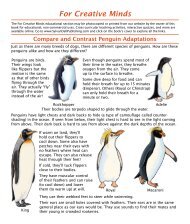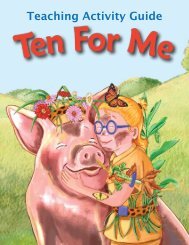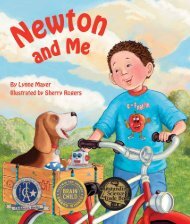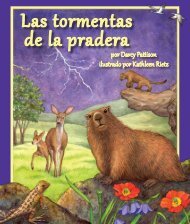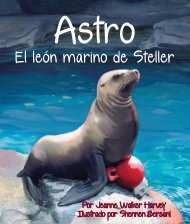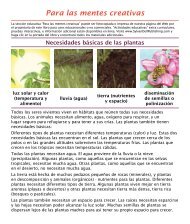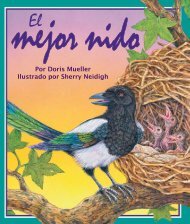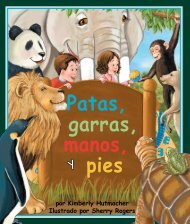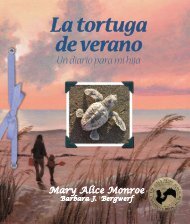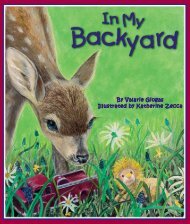Meet the Planets - Sylvan Dell Publishing
Meet the Planets - Sylvan Dell Publishing
Meet the Planets - Sylvan Dell Publishing
Create successful ePaper yourself
Turn your PDF publications into a flip-book with our unique Google optimized e-Paper software.
Vocabulary Game<br />
This activity is a very general idea and is designed to get children thinking of<br />
vocabulary words that will <strong>the</strong>n be used as <strong>the</strong> beginning vocabulary list for a<br />
science lesson.<br />
Select an illustration from <strong>the</strong> book and give <strong>the</strong> children a specific length<br />
of time (five minutes) to write down all <strong>the</strong> words <strong>the</strong>y can think of about<br />
<strong>the</strong> particular subject. If you do not have classroom sets of <strong>the</strong> book, it is<br />
helpful to project an illustration on a whiteboard. Check Web site (www.<br />
<strong>Sylvan</strong><strong>Dell</strong><strong>Publishing</strong>.com) for book “previews” that may be used.<br />
The children’s word list should include anything and everything that comes to<br />
mind, including nouns, verbs, and adjectives. At <strong>the</strong> end of <strong>the</strong> time, have each<br />
child take turns reading a word from his/her list. If anyone else has <strong>the</strong> word,<br />
<strong>the</strong> reader does nothing. However, if <strong>the</strong> reader is <strong>the</strong> only one with <strong>the</strong> word,<br />
he/she should circle it. While reading <strong>the</strong> list, one person should write <strong>the</strong><br />
word on a flashcard or large index card and post it on a bulletin board or wall.<br />
At <strong>the</strong> end, <strong>the</strong> child with <strong>the</strong> most words circled “wins.” And you have a start<br />
to your science vocabulary list. Note: if a child uses an incorrect word, this is a<br />
good time to explain <strong>the</strong> proper word or <strong>the</strong> proper usage.<br />
Using <strong>the</strong> Words<br />
The following activities may be done all at once or over a period of several days.<br />
• Continue to add words to <strong>the</strong> vocabulary list as children think of <strong>the</strong>m.<br />
• Sort vocabulary words into nouns, verbs, adjectives, etc. and write what <strong>the</strong>y<br />
are on <strong>the</strong> backs of <strong>the</strong> cards. When <strong>the</strong> cards are turned over, all you will<br />
see is “noun,” etc. (<strong>the</strong>se can <strong>the</strong>n be used to create silly sentences on <strong>the</strong><br />
next page).<br />
• Now sort <strong>the</strong> vocabulary words into more specific categories. For example,<br />
nouns can be divided into plants, animals, rocks, minerals, etc. They can be<br />
divided into living/non-living, or into habitat-related words.<br />
• Have children create sentences using <strong>the</strong>ir vocabulary words. Each sentence<br />
could be written on a separate slip of paper.<br />
• Have children (individually or in small groups) sort and put sentences into<br />
informative paragraphs or a story.<br />
• Edit and re-write paragraphs into one informative paper or a story.<br />
<strong>Sylvan</strong> <strong>Dell</strong> <strong>Publishing</strong> 11 Return to Table of Contents



